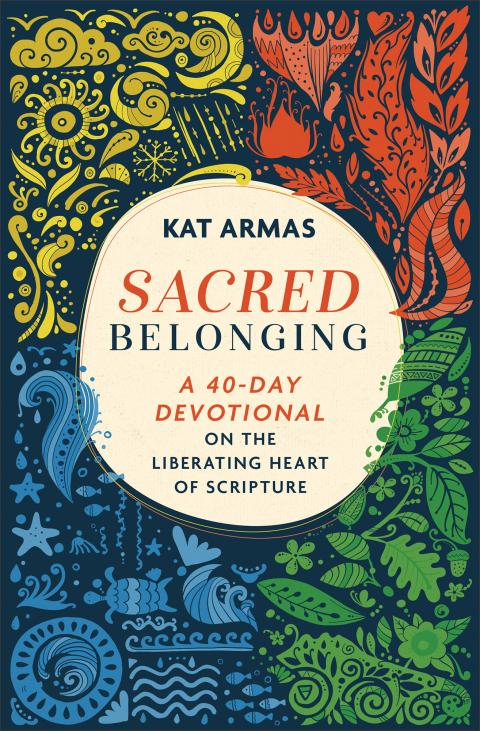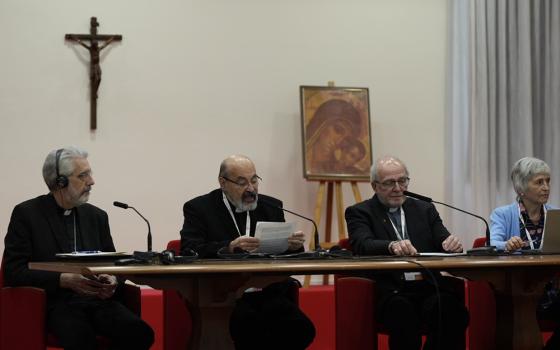
Kat Armas is a Cuban American writer and speaker. She hosts "The Protagonistas" podcast, where she highlights stories of everyday women of color, including writers, pastors, church leaders and theologians. She is the author of Abuelita Faith and Sacred Belonging. (Courtesy of Brazos Press)
Editor's note: To kick off the new year, EarthBeat is sharing four creation-themed devotions from Kat Armas' book "Sacred Belonging: A 40-Day Devotional on the Liberating Heart of Scripture" (Brazos Press, a division of Baker Publishing Group, Sept. 12, 2023, used by permission).
Subscribe here to the EarthBeat Reflections e-mail list to receive these devotions in your inbox on Jan. 1, 8, 15 and 22, as well as future spirituality content from EarthBeat.
We know that the whole creation is groaning together and suffering labor pains up until now.
—Romans 8:22
I am standing almost fifteen thousand feet above sea level, nearly a week into a hike I was not prepared to undertake. My feet are blistered, and my body is in so much pain from climbing that I am numb. We were about twelve hours from the summit, and I had lagged behind the group. My Miami-attuned lungs, not used to the high elevation, weren't cooperating. With every failed deep breath I attempted to take, my lungs wheezed as if to plead with me, we belong in the tropics. This terrain was not the terrain of my ancestors. But my tour guide and new friend Manco — a native to this land — showed me the way, offering patience and generosity every time my pace slowed down. When I stopped to gather my breath, he'd stop too, pulling coca leaves out of his pocket and rubbing them in his palms like a potion, gesturing for me to inhale. "Breathe," he'd say, drawing the word out as he exhaled.
Raw coca leaves were sacred to the Incas because of their healing properties, and they are still an integral part of Peruvian national heritage — particularly when treating altitude sickness. My eyes lit up every time I inhaled from his worn hands and felt the oxygen fill the deep crevices of my lungs. Manco would laugh, satisfied. "The earth heals us," he'd remind me. It seemed to please him to share with me the wisdom of that place. The earth — his earth — was saving me, and I think that made him proud.
About fifty miles northwest of Cuzco, Peru, high up in the Andes, sits Machu Picchu, the ancient Incan citadel built in the fifteenth century. This "wonder of the world" is believed to have been the home of Emperor Pachacuti and draws over a million tourists every year to its breathtaking landscape.

Before visiting in 2015, I researched the multiple ways to get to the site, one of which is the Salkantay Trail, which takes you to the base of the city. I didn't have much hiking experience but decided to take this route to get the best vantage of the Andes in all their glory. I should've been a bit more prepared.
The journey took several days of trekking through rugged terrain, from cloud forests to lush jungles. During the day, we walked for dozens of miles at steadily increasing elevation, passing waterfalls and grazing sheep. At night we slurped stew from a community pot and slept on the dirt, under the stars.
Accompanied by those native to the mountains, we learned that Salkantay means "wild mountain" in Quechua, the Incas' native language. The Incas believed that each mountain has its own spirit. According to their mythology, apus (mountain spirits) protect nearby territories and inhabitants, including cattle and crops. The most significant apus are associated with the highest Peruvian mountains, Salkantay being the second most important. Learning this helped me recognize the great honor it was to be in her midst. If you've ever stood among the mountains, you may have experienced a sense of this — the rush of an energy beyond your own that shallows your breath and makes your heart skip a few beats.
One morning, as we neared the summit, I began to hear a strange rumbling in the air that did not belong, something that seemed improbable. Jets? I wondered to myself, confused. What are jets doing out here? When I turned to look for the source of the intensifying roar, instead of a plane I saw birds. I realized what I was hearing was not a jet but the sound of wings ripping through the air — a sound I did not know existed. It was otherworldly, almost too overwhelming to bear. I sat down on the nearest rock and cried. Manco looked over at me.
"The mountain is speaking to you?" he asked.
I nodded.
"Good. It means you're listening."
The energy changed when we finally arrived at Machu Picchu. More breathtaking than the views is the ancient architecture. The massive blocks manipulated into walls and temples and towers (without the use of mortar) have left archaeologists speechless. Their feats of engineering have earned the Incas classification as one of the most advanced early civilizations in the world.
Our marveling at the site was tempered by the heaviness in the voices of some of our guides as they taught us about how Machu Picchu was abandoned by the Incas shortly before European conquistadors arrived, which is probably why it was left undiscovered and relatively untouched for so long. This didn't stop the effects of the Spanish conquest, however, as the Inca population was eradicated by smallpox due to interactions with the colonizers.
"The mountains tell their own stories. Sometimes their stories are of beauty and sometimes of pain," they told us.
The beauty of Machu Picchu doesn't erase the stench of death that marks the scenery. Perhaps it even intensifies it. Standing in the presence of the mountains, I wondered how the apus felt about the mistreatment the original inhabitants and caretakers endured. Did they grieve the injustices the earth herself experienced?
The space once sacred was now becoming a resource for consumption. Before the COVID-19 pandemic slowed tourism down, the ruins and the infrastructure were being overwhelmed. Machu Picchu continues to suffer harm from an economy of extraction.
I lagged behind the group again (this time on purpose) and sat by yet another rock to cry. This time with feelings of heaviness over death, decay, and exploitation. I grieved the system that had led me there in the first place.
My friend Manco joined me on the stone.
"You know what this means?" he whispered.
I'm listening.
Advertisement
Paul describes creation as groaning alongside humanity in his letter to the Romans — those living in the epicenter of empire and antagonized daily by the woes of imperialism. At the heart of every empire is an insatiable desire to rule over the natural world and every creature living within it. The Roman Empire, specifically, not only wanted to restructure and remake the whole world, but its rulers believed they had already ushered forth the golden age of peace and prosperity.
Paul's powerful image tells of the shared grief we experience in concert with the planet, but what makes his words subversive is the fact that he uses imperialistic language to construct a worldview that opposes imperial ideology. In doing this, Paul envisions a new world — one remade not by the empire but by God.
Much like empires today, the Roman Empire set out to ravage the world through military domination and economic exploitation. It destroyed entire cities, deforested mountains, depleted fields once ripe for harvest, and polluted water once teeming with food and drink. In response, the cosmos cried out in pain. Paul's personification of the earth tells the story of "a holistic, interdependent system with a life and development of its own."
For Paul, the earth is our kin, groaning alongside of us. This declaration subverts imperial logic that didn't — and still doesn't — care about or value creation. According to the book of Romans, both humans and the natural world share in the longing for new life. This is true across history, as the suffering of people and the suffering of land have always gone together. Indeed, advocating for justice for the land and advocating for justice for humankind are not separate endeavors. When the land suffers, so do those who depend on it. When we protest and fight against the devastation of the earth, we are doing so for the dignity of the people who live on it.
The Bible affirms this. Leviticus 25:2 commands that the land itself must observe a Sabbath. The idea is that the land is to be maintained so that it remains just as fertile when passed on as it was when received. The intent was that the land would continue to produce for the long haul — for future generations — and support sustainable farming practices, which inevitably helps the poor.
Throughout the Bible, the natural world joins both God and the prophets in bearing witness against humanity's evils and injustices. Isaiah, Micah, Hosea, and Jeremiah all describe the earth's mourning and languishing caused by the burden of human exploitation. Our world has so much to grieve: the injustice toward her inhabitants, the eradication of her kin. We kill not only each other but also the very place we call home.
But we are not alone in our lament. God mourns with us: "I will weep and wail for the mountains," God says in Jeremiah 9:10, "and lament for the grazing lands in the wilderness. They are dried up and deserted; no sound of the flocks is heard; no sign of birds or animals is seen; all have vanished."
What is our truest response but, like God, to grieve?
Eco-philosopher Joanna Macy explains that grief is a doorway into a deeper understanding of life, identity, and interconnectedness. "The most important thing we can do for the sake of our planet is to hear within ourselves the sounds of the earth crying." She goes on to echo the words of Buddhist monk Thich Nhat Hanh, "Until we can grieve for our planet we cannot love it — grieving is a sign of spiritual health."
Grief can seem pitiful, offensive, or inconvenient to some Christians, as it has nothing to do with a victorious God. To those who have embraced an imperial Christ, grief is weakness. But this is precisely why we need to grieve: as resistance and as a spiritual practice. We need "tears that cleanse," as Macy says. Our grief "is not a private burden but a shared experience on this planet."
So let us lament. It means we're listening.










